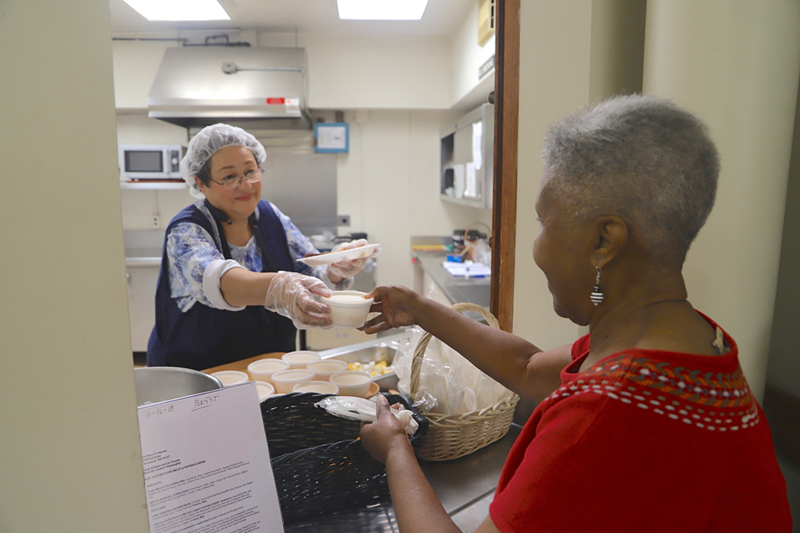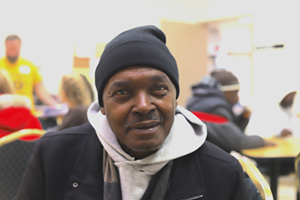On most days, Wendell Russell makes the short walk from his home to the Over-the-Rhine Senior Services Center in the morning so he can eat breakfast and sit and talk with other seniors who live in the area. He then stops back by his house to rest a little before coming back over for lunch and activities.
Russell lives by himself, but he doesn’t feel alone, he says, because the center is there.
That will change — at least somewhat — soon. Due to funding cuts from the city and United Way of Greater Cincinnati, as well as mounting costs associated with the aging building at 1720 Race St., the senior center will move its programming to Mount Auburn at the end of the month after 30 years in OTR.
Many of the seniors who come through the door for the roughly 70 meals the center serves each day live nearby and have been coming for years. According to center director Cheryl Ware, they come for more than food. The sense of connection, the community and the conversation draw them back.
“This is a home for them,” she says between fielding phone calls from seniors concerned about reports they’ve heard that the center is already closed.
That is not the case — the OTR location will be open until the end of the month. After that point, shuttles will take seniors up the hill to the Church of Our Savior at 65 East Hollister St. In a memo issued Nov. 16, acting Cincinnati City Manager Patrick Duhaney said the Cincinnati Recreation Commission is also investigating possibly hosting similar programming at some of its OTR spaces.
“It’s convenient,” Russell says of the current spot. “I stay right over on Elm Street. When they said they were moving, I was disappointed by that. They don’t have other facilities for seniors down here. I didn’t want them to move, but what can I say? If they won’t reinstate the funding, we have to move on. “
The impending closure has caused some concern in a neighborhood that has seen big changes in the last decade. Advocates see the senior center’s departure as yet another loss of a vital social service in a neighborhood that is redeveloping but still predominantly black with a median household income around $15,000 a year. Over recent years, some other social services have left the neighborhood, especially the half south of Liberty Street, where hundreds of millions of dollars have been spent on higher-end commercial and residential redevelopment.
The center is closing "not due to lack of participation, but due to lack of funding," Over-the-Rhine Community Housing Executive Director Mary Burke Rivers wrote on social media after learning of the impending closure. "So with all the development in Over-the-Rhine; all the profits; all the appreciated property values, no money trickled to this community asset."
Social service advocates planned a rally Nov. 19 to keep the center open, calling on Cincinnati City Council and others to find solutions to the center’s funding situation.
Cincinnati Area Senior Services runs the senior center. CEO Tracey Collins says CASS was looking at a deficit of up to $100,000 next year for the center.
"Even if we got an influx of money tomorrow, we'd be in the same situation six months from now," she says, due to a move away from funding for programs like those provided by the senior center.
Over the last few years, the center has seen its funding dwindle. Federal funding for programs that provide meals to seniors has been flat for more than a decade, Collins says. To make matters worse, between 2007 and 2015, CASS gradually lost $130,000 a year in funding it received from the City of Cincinnati for programming at the center. In the last three years, it has received no funding from the city as focus for human services funding has shifted to other areas, including workforce development.
The city owns the building the senior center uses, but CASS pays for all operating costs at the location. That includes not only heat, electric and water, but all upkeep and major repairs, as well as security and cleaning. That, Collins says, has gotten expensive in the aging building. Earlier this year, for example, the center was shuttered for 10 weeks as crews worked to repair damage from an August flood.
The city isn't evicting the center or raising its rent, Collins stresses — but neither is it providing the funding it once did.
On top of all that, last year, CASS also lost half of its United Way of Greater Cincinnati funding for the senior center, and staff there says they expect further cuts this year as UWGC faces a large fundraising shortfall.
Russell has been coming for years, he says — so long he can’t remember exactly when he first started.
“After I’d been coming for a while, things started sticking out to me,” he says. “One of them was the atmosphere. Cheryl doesn’t put up with shenanigans. It’s nice and clean, and they serve good healthy meals. And as I started coming back, I started making connections with other people.”
The activities, he says, are great — cards, checkers, chess and others. Russell is an especially big fan of bingo games as well as recent carnival and Hawaiian-themed parties complete with dancing "to get the blood flowing," he says.
Beyond the fun, the connections made at the center have proven key, visitors to there say. Many of the other seniors who come here also live alone. The center and its staff have become comforting constants in the uncertainty that sometimes comes late in life.
“It feels safe,” Russell says. “You know how us seniors are — sometimes we start tripping about safety. And, you know, being up in age like this — seniors move on, they leave this life. Cheryl is willing to sit down and talk about it. And if we don’t show up for a few days, she’ll call. I stay alone and I appreciate her checking up on me when I don’t show up.”
Others echo Russell's sentiments.
“I come here to meet up with the people I grew up with,” Barbara Bishop says. “They really look out for us here.”
Bishop lives nearby and walks to the center. But she won’t let the location change stop her from coming.
“If we have to get on a shuttle to get there, I’ll go,” she says. “It will probably be different. But I sure will.”
Russell isn’t as sure yet.
“I’m thinking about it,” he says. “I’ll investigate. I don’t know if the same group that meets here will come up there. It’s the group and the atmosphere that make it special. That’s what keeps me coming back.”
CASS CEO Collins says she hopes folks like Russell won’t be deterred by the change in location.
"We don’t want them to feel hopeless," she says. "We’re going to do everything we can to encourage them to take the shuttles we provide. We want to do everything we can to get them to go to this new location. Yes, we aren't going to be in this building, but we’re going to be providing that same sense of community. I know change is really hard, but we don’t want them to feel like there isn’t an alternative.”







